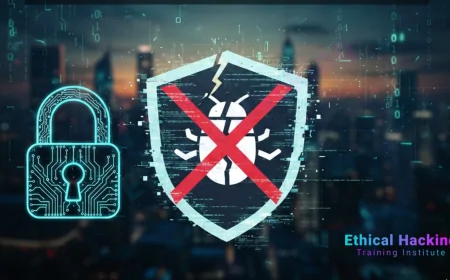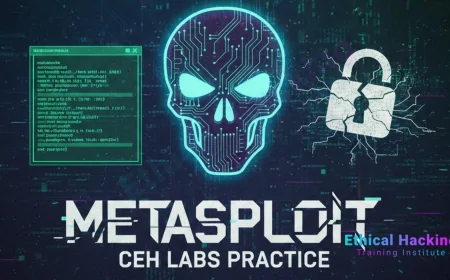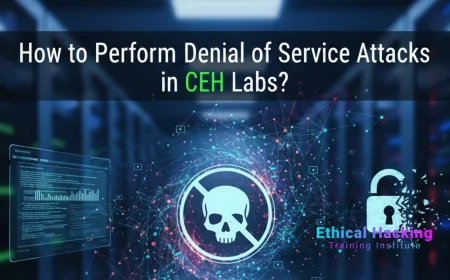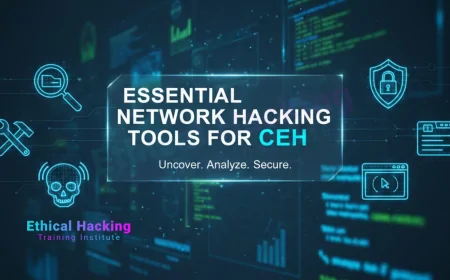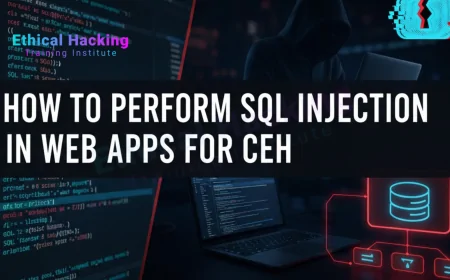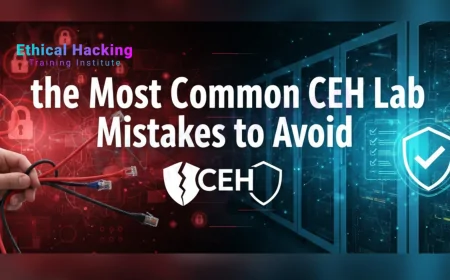How to Get Your Hacking Certificate and Boost Your Cybersecurity Career | Learn Ethical Hacking, Get Certified, and Grow Your Cyber Career
Learn how to get your hacking certificate, choose the right course, and advance your cybersecurity career with top certifications and skills.
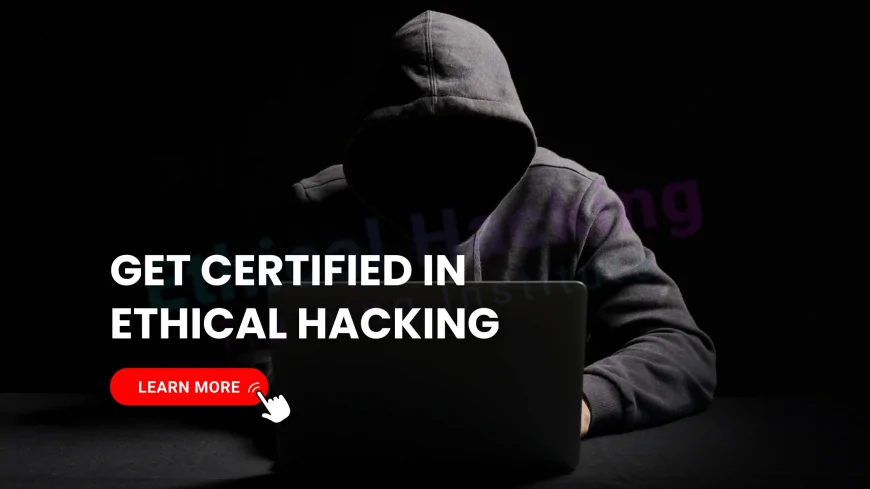
Table of Contents
- Introduction
- What Is a Hacking Certificate?
- Why Get Certified in Ethical Hacking?
- Popular Hacking Certifications
- Who Can Apply?
- Steps to Get Certified
- Best Online and Offline Platforms
- Skills You'll Learn
- Tools Covered in Hacking Courses
- Cybersecurity Career Paths
- Average Salaries After Certification
- Course Duration & Cost
- Tips for Exam Success
- Real-World Project Experience
- Internship & Placement Support
- Can You Learn Hacking Remotely?
- Advanced Certifications
- Freelancing & Remote Jobs
- FAQs
- Conclusion
Introduction
Hacking isn't just about breaking systems—it's about protecting them too. Ethical hacking is a high-demand skill, and a professional hacking certificate proves your ability to identify and fix security vulnerabilities. In this guide, you'll learn how to get certified, the top programs to choose from, and how this path can boost your cybersecurity career.
What Is a Hacking Certificate?
A hacking certificate, also called an ethical hacking certification, is an official credential that verifies your knowledge and skills in ethical hacking, penetration testing, and cybersecurity. It proves that you understand how to legally and ethically identify vulnerabilities in systems, networks, applications, and digital infrastructure.
These certificates are typically issued by recognized organizations such as:
-
EC-Council (for CEH – Certified Ethical Hacker)
-
Offensive Security (for OSCP – Offensive Security Certified Professional)
-
CompTIA (for PenTest+)
-
INE/ElearnSecurity (for eJPT – Junior Penetration Tester)
What It Includes:
-
Theory: Security concepts, laws, attack vectors, etc.
-
Practical Labs: Real-world scenarios for network & web app testing
-
Exam: Usually a timed test (some include hands-on practical exams)
-
Validity: Often valid for 2–3 years with options to renew
Getting certified is one of the best ways to build credibility in the cybersecurity field and qualify for ethical hacking, penetration testing, and cybersecurity analyst jobs.
Would you like this included in your full HTML document or expanded with comparisons between different certifications (like CEH vs OSCP)?
Why Get Certified in Ethical Hacking?
- Proves your credibility and skills
- Helps you get hired in cybersecurity roles
- Qualifies you for better-paying jobs
- Gives access to advanced learning opportunities
Popular Hacking Certifications
- CEH (Certified Ethical Hacker) – Offered by EC-Council
- CompTIA PenTest+ – Good for penetration testing fundamentals
- OSCP (Offensive Security Certified Professional) – Practical hands-on certification
- eJPT (Junior Penetration Tester) – Ideal for beginners
Who Can Apply?
Anyone with a basic understanding of computers and networking can apply for an ethical hacking certificate. These certifications are designed for a wide range of learners—from complete beginners to experienced IT professionals.
Here’s a breakdown of who is eligible:
Beginners & Students
-
No prior hacking experience required
-
Recommended: basic knowledge of operating systems, TCP/IP, or Linux
-
Ideal for learners who want to start a career in cybersecurity
IT Professionals
-
System administrators, network engineers, software developers, or tech support staff
-
Looking to upskill into cybersecurity or ethical hacking roles
Career Changers
-
Professionals from non-IT backgrounds (commerce, law, etc.) with a strong interest in tech
-
Many switch careers after taking foundational courses
Degree Requirements
-
No formal degree is mandatory
-
Certifications like CEH or eJPT focus more on skills than academic background
Open to:
-
Freshers
-
Working professionals
-
Freelancers
-
Women returning to work
-
Self-taught hackers
Steps to Get Certified
- Choose a certification based on your level (beginner/intermediate/advanced)
- Enroll in a certified training program
- Practice with real-world labs and tools
- Schedule your certification exam
- Pass the exam and receive your certification
Best Online and Offline Platforms
- WebAsha Technologies – EC-Council Accredited Partner with CEH live and online courses,High-quality structured learning
Skills You'll Learn
- Reconnaissance, scanning, enumeration
- System hacking and privilege escalation
- Web application testing (SQLi, XSS, CSRF)
- Wi-Fi and IoT hacking
- Report writing and vulnerability analysis
Tools Covered in Hacking Courses
- Kali Linux, Metasploit, Nmap
- Burp Suite, Wireshark
- John the Ripper, Hydra
- Aircrack-ng, SQLmap, Nikto
Cybersecurity Career Paths
After earning your certificate, you can apply for:
- Ethical Hacker
- Penetration Tester
- Vulnerability Analyst
- SOC Analyst
- Cybersecurity Consultant
Average Salaries After Certification
- India: ₹4 LPA to ₹10+ LPA
- USA: $70,000 to $130,000 annually
Course Duration & Cost
- CEH: 40 hours (₹35,000 – ₹80,000)
- eJPT: 20–30 hours (around $200)
- OSCP: 90-day labs (~$1,499)
Tips for Exam Success
- Use official training material
- Complete all labs and practice scenarios
- Join discussion forums (Reddit, Discord)
- Take mock tests before appearing
Real-World Project Experience
Many institutes include simulated attack-defense environments, capture-the-flag (CTF) challenges, and vulnerability reporting exercises as part of final assessments.
Internship & Placement Support
WebAsha, Hacker School, and EC-Council ATPs offer internship connections, placement drives, and mentorship post-training to help you get hired.
Can You Learn Hacking Remotely?
Absolutely. Top courses now offer online labs, virtual machines, cloud-based hacking environments, and live mentor support—perfect for remote learners.
Advanced Certifications
- OSCE (Offensive Security Certified Expert)
- CREST CRT, CPSA (UK standards)
- GIAC GPEN, GSEC (via SANS Institute)
Freelancing & Remote Jobs
Certified ethical hackers can freelance as bug bounty hunters, security auditors, or consultants on platforms like Upwork, HackerOne, and Bugcrowd.
Frequently Asked Questions (FAQs)
1. What is a hacking certificate?
A document that proves you’ve completed formal ethical hacking training and passed a recognized exam.
2. Is CEH better than OSCP?
CEH is broader and theory-based; OSCP is hands-on and highly technical. Choose based on your experience level.
3. How long does it take to become certified?
Anywhere from 1 month (for CEH) to 3 months (for OSCP), depending on your pace.
4. Can I get certified for free?
Some platforms offer free training, but official certifications usually require a paid exam.
5. Do I need a degree?
No. Many successful ethical hackers are self-taught or certified without a formal degree.
6. Is ethical hacking legal?
Yes, when done with permission, in a professional or educational context.
7. Are there jobs after certification?
Yes—certified professionals are in high demand across industries.
8. Which is the best beginner course?
eJPT or CEH v13 with hands-on labs is ideal for entry-level learners.
9. Do these courses cover real hacking?
Yes, but within ethical boundaries and in simulated environments.
10. Can I learn hacking online?
Absolutely—many top programs now offer virtual labs and mentoring.
11. What tools do I need?
Kali Linux, Metasploit, Nmap, Burp Suite, and more depending on the course.
12. Can I learn hacking without coding?
Yes, but basic scripting (Python, Bash) helps with automation and testing.
13. What’s the cost of CEH?
Varies from ₹35,000–₹80,000 depending on training and exam inclusion.
14. Is there job assistance?
Many institutes like WebAsha offer internships and placement help.
15. What’s the salary after certification?
Typically ₹4LPA to ₹10LPA in India; $70K+ in global markets.
16. Which certification is most respected?
CEH, OSCP, and GIAC certifications are globally respected.
17. Can I work remotely?
Yes—cybersecurity roles often offer remote flexibility.
18. What is bug bounty?
A reward-based system for finding real bugs on live websites legally.
19. What’s the difference between CEH and PenTest+?
CEH is broader; PenTest+ focuses more on penetration testing skills.
20. How do I get started today?
Pick a beginner course like CEH or eJPT, enroll online, and begin practicing labs!
Conclusion
Getting certified as an ethical hacker is one of the most rewarding decisions in cybersecurity. It validates your skills, builds career credibility, and opens doors to lucrative opportunities. Choose a program that fits your goals, learn consistently, and stay current with industry trends. With the right certification, tools, and mindset—you can secure not just networks, but your future too.
What's Your Reaction?
 Like
0
Like
0
 Dislike
0
Dislike
0
 Love
0
Love
0
 Funny
0
Funny
0
 Angry
0
Angry
0
 Sad
0
Sad
0
 Wow
0
Wow
0
